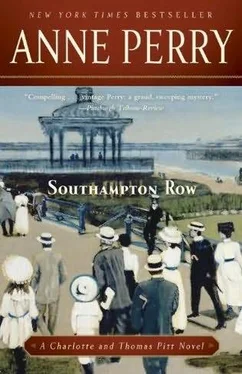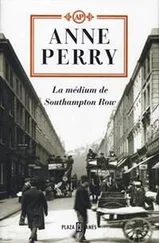Anne Perry - Southampton Row
Здесь есть возможность читать онлайн «Anne Perry - Southampton Row» весь текст электронной книги совершенно бесплатно (целиком полную версию без сокращений). В некоторых случаях можно слушать аудио, скачать через торрент в формате fb2 и присутствует краткое содержание. Жанр: Исторический детектив, на английском языке. Описание произведения, (предисловие) а так же отзывы посетителей доступны на портале библиотеки ЛибКат.
- Название:Southampton Row
- Автор:
- Жанр:
- Год:неизвестен
- ISBN:нет данных
- Рейтинг книги:5 / 5. Голосов: 1
-
Избранное:Добавить в избранное
- Отзывы:
-
Ваша оценка:
- 100
- 1
- 2
- 3
- 4
- 5
Southampton Row: краткое содержание, описание и аннотация
Предлагаем к чтению аннотацию, описание, краткое содержание или предисловие (зависит от того, что написал сам автор книги «Southampton Row»). Если вы не нашли необходимую информацию о книге — напишите в комментариях, мы постараемся отыскать её.
Southampton Row — читать онлайн бесплатно полную книгу (весь текст) целиком
Ниже представлен текст книги, разбитый по страницам. Система сохранения места последней прочитанной страницы, позволяет с удобством читать онлайн бесплатно книгу «Southampton Row», без необходимости каждый раз заново искать на чём Вы остановились. Поставьте закладку, и сможете в любой момент перейти на страницу, на которой закончили чтение.
Интервал:
Закладка:
“Emily, how delightful to see you!” she said with enthusiasm. Her glance swept up and down Emily’s dress in immediate appreciation, but with a flash of amusement she deliberately avoided saying anything about it. “What a pleasure you could come!”
Emily smiled back. “As if you had not known I should!” She raised her eyebrows. They both knew Rose would have been familiar with the guest list or she would not have accepted.
“Well, I did have just the slightest idea,” Rose admitted. She leaned a little closer. “It feels a trifle like the ball the night before Waterloo, doesn’t it?”
“Not an occasion I recall,” Emily murmured in mock spite.
Rose made a very slight face at her. “Tomorrow we ride into battle!” she responded with exaggerated patience.
“My dear, we have been at war for months,” Emily replied as Jack was drawn into a group of men close by. “If not years!” she added.
“Don’t shoot until you see the whites of their eyes,” Rose warned. “Or in Lady Garson’s case, the yellow. That woman drinks enough to drown a horse.”
“You should have seen her mother!” Emily shrugged delicately. “She could have drowned a giraffe.”
Rose threw back her head and laughed, a rich, infectious sound that caused half a dozen of the men to look at her with pleasure, and their wives to stare with disapproval, before deliberately turning away.
The dining room was blazing with light from the chandeliers and reflected from a thousand facets of crystal on the table and the sheen of silver on snow-white linen. Roses spilled out of silver bowls and long vines of honeysuckle trailed down the center of the cloth, sending up a rich perfume.
At each place setting there was a menu card-written in French, naturally. The guest’s name was on the front to indicate where each person should sit. The footmen began to serve soup, according to each guest’s preference, the choice being oxtail or bisque. Emily was placed between a Liberal elder statesman on her left and a generous banker on her right. She declined the soup, knowing there were a further eight courses to come, but the banker took the oxtail and began to eat immediately, it being correct to do so.
Emily glanced across the table at Jack, but he was busy conversing with a Liberal member who would also be defending his seat against a vigorous attack. She caught the odd word, indicating that they were concerned with the factions among the Irish members, which would almost certainly make the difference if the main parties were close in number. The ability to form a government might depend upon winning the support of either the Parnellites or anti-Parnellites.
Emily was tired of the issues of Home Rule simply because they had been argued over for as long as she could remember, and seemed no closer to a solution than when she had first had them explained to her in the schoolroom. She bent her attention to charming the rather grand elder statesman to her left, who had also declined a first course.
The second course was a choice of salmon or smelts.
She chose salmon, and for a little while refrained from conversation.
She declined the entrees, not wishing for curried eggs or sweetbreads with mushrooms, and listened to what she could catch of the discussion across the table.
“I think we should take him very seriously,” Aubrey Serracold was saying, bending forward a little. The light caught his fair head, his long face filled with seriousness, all laughter gone, even his usual self-deprecating charm for once invisible.
“For heaven’s sake!” the senior statesman protested, his cheeks pink. “The man left school at ten years old and went down the mines! Even other miners have more sense than to imagine he can do anything for them in Parliament, except make a fool of himself. He lost in his native Scotland; he hasn’t a chance here in London.”
“Of course not,” said a bluff-faced man opposite who turned around indignantly, reaching for his wine and holding it for a moment before drinking. “We are the natural party for the workingman, not some newfangled creation of wild-eyed fanatics with picks and shovels in their hands!”
“That is just the kind of blindness that will lose us the future!” Aubrey returned with utmost seriousness. “Keir Hardie should not be dismissed lightly. A lot of men will see his courage and determination, and know how he has bettered his situation. They will think that if he can achieve so much for himself he can do the same for them.”
“Take them out of the mines and put them in Parliament?” a woman in poppy-red said incredulously.
“Oh dear!” Rose twisted her glass in her fingers. “Then what on earth shall we burn on our fires? I doubt the present incumbents would be the slightest practical use.”
There was a burst of laughter, but it was high-pitched, and too loud.
Jack smiled. “Very funny as a dinner table joke-not so amusing if the miners listen to him and vote for more like him, who are full of passion to reform but haven’t any idea of the cost of it-I mean the real cost, in trade and dependent livelihoods.”
“They won’t listen to him!” a white-whiskered man said with a gesture to courtesy, but his voice was dismissive of the seriousness Jack invested in the subject. “Most men have more sense.” He saw Jack’s expression of doubt. “For heaven’s sake, Radley, only half the men in the land vote! How many miners own their own houses or pay more than ten pounds a year in rent?”
“So by definition”-Aubrey Serracold turned to face him, his eyes wide-“those who can vote are those who prosper under the system as it is now? That rather invalidates the argument, doesn’t it?”
There was a quick exchange of glances across the table. This remark was unexpected, and to judge from several of them, also unwelcome.
“What are you saying, Serracold?” the white-whiskered man asked carefully. “If a thing works, change it?”
“No,” Aubrey replied equally carefully. “If it works for one section of the people, it is not that section who should have the right to decide whether to keep it or not, because we all have the tendency to see things from our own view and to preserve what is in our own interest.”
The footman removed the used plates and, almost unnoticed, served iced asparagus.
“You have a very poor opinion of your fellows in government,” a red-haired man said a trifle sourly. “I’m surprised you want to join us!”
Aubrey smiled with extraordinary charm, looking down for a moment before turning to the speaker. “Not at all. I think we are wise and just enough to use power only as it is honestly given, but I have no such confidence in our opponents.” He was met with a shout of laughter, but Emily saw that it did not entirely dispel the anxiety-in Jack, at least. She knew him well enough to see and understand the tension in his hands as he held his knife and fork and with dexterity cut the tips off the asparagus spears. He did not speak again for several minutes.
The conversation turned to other aspects of politics. The used dishes were taken and replaced with game-quail, grouse or partridge. Emily still did not accept any. Young ladies were always advised not to, as it might make their breath strong. She had always wondered why it was acceptable for men to. She had once asked her father, and received a look of blank amazement. The inequity of it had never occurred to him.
She declined still, not considering herself old enough to be disqualified from it mattering. She hoped she never would be.
After game there were sweets. The menu offered ice pudding, confiture of nectarines, iced meringues or strawberry jelly, which she accepted. She ate the jelly with her fork, as required by etiquette, an art necessitating a certain degree of concentration.
Читать дальшеИнтервал:
Закладка:
Похожие книги на «Southampton Row»
Представляем Вашему вниманию похожие книги на «Southampton Row» списком для выбора. Мы отобрали схожую по названию и смыслу литературу в надежде предоставить читателям больше вариантов отыскать новые, интересные, ещё непрочитанные произведения.
Обсуждение, отзывы о книге «Southampton Row» и просто собственные мнения читателей. Оставьте ваши комментарии, напишите, что Вы думаете о произведении, его смысле или главных героях. Укажите что конкретно понравилось, а что нет, и почему Вы так считаете.












